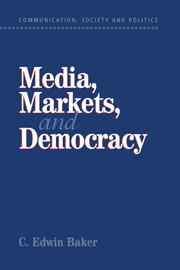Book contents
- Frontmatter
- Contents
- Preface
- PART I SERVING AUDIENCES
- 1 Not Toasters: The Special Nature of Media Products
- 2 Public Goods and Monopolistic Competition
- 3 The Problem of Externalities
- 4 The Market as a Measure of Preferences
- 5 Where To? Policy Responses
- PART II SERVING CITIZENS
- PART III AN ILLUSTRATION: INTERNATIONAL TRADE
- CONCLUSION
- Notes
- Index
1 - Not Toasters: The Special Nature of Media Products
Published online by Cambridge University Press: 10 December 2009
- Frontmatter
- Contents
- Preface
- PART I SERVING AUDIENCES
- 1 Not Toasters: The Special Nature of Media Products
- 2 Public Goods and Monopolistic Competition
- 3 The Problem of Externalities
- 4 The Market as a Measure of Preferences
- 5 Where To? Policy Responses
- PART II SERVING CITIZENS
- PART III AN ILLUSTRATION: INTERNATIONAL TRADE
- CONCLUSION
- Notes
- Index
Summary
Economics-oriented critics of government intervention in the media realm typically rely on oversimplified economics. Under certain purportedly normal circumstances, the market provides firms with an incentive to produce and sell the product as long as the product's cost (e.g., its cost of production and distribution) is less than the purchaser will pay, that is, as long as marginal costs are less than marginal price. The market thereby leads to a preference-maximizing production and distribution. This I call the “standard model.”
The standard model is subject to a host of general critiques mostly related to why the market will fail or will be dysfunctional. As one example of the latter, note that market competition creates an incentive for a market enterprise (e.g., capital holders) to gain power in relation to other resource owners (e.g., labor or other competitors) as much as it creates an incentive to produce goods efficiently. The power struggles between stakeholders, however, are primarily over distribution and do not produce any goods. As such, they waste resources as well as often generating unjust distributions.
Of course, no one ever claims that the market works perfectly. Still, despite its problems, many find the standard model relatively adequate, at least enough so that it provides a presumptive reason to rely on “free” markets. For present purposes, I assume that the market generally works relatively well – for example, it effectively and efficiently leads to roughly the right production and distribution of cars or can openers.
- Type
- Chapter
- Information
- Media, Markets, and Democracy , pp. 7 - 19Publisher: Cambridge University PressPrint publication year: 2001



